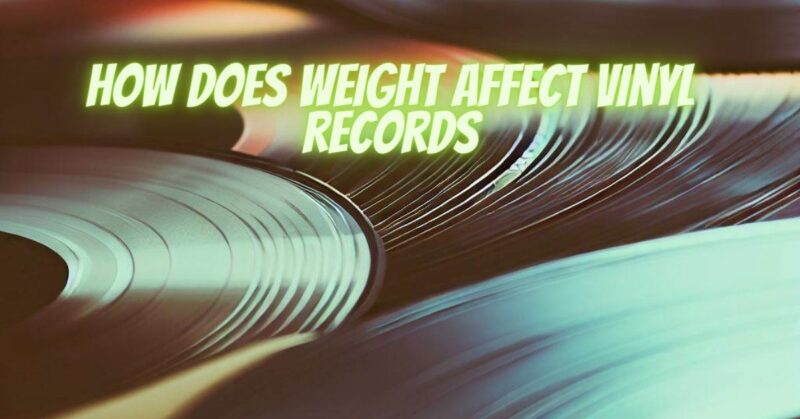Vinyl records have transcended generations, providing a tangible and nostalgic way to experience music. However, beyond their grooves and intricate designs, the weight of vinyl records plays a crucial role in their sound quality, durability, and overall performance. In this article, we’ll delve into the relationship between weight and vinyl records, exploring how it affects their sonic characteristics, longevity, and the overall vinyl listening experience.
Understanding Vinyl Record Weight
Vinyl records come in varying weights, often measured in grams. The standard weight for vinyl records typically ranges from 120 to 180 grams, with heavier records often associated with higher quality pressings and potential sonic benefits.
Impact on Sound Quality
- Groove Depth and Clarity: Heavier vinyl records tend to have deeper grooves, allowing for greater detail in the audio signal. This can result in improved clarity and definition in the sound.
- Reduced Surface Noise: The increased thickness of heavier records can help reduce surface noise caused by dust, scratches, and imperfections, leading to a quieter listening experience.
- Resonance and Bass Response: Heavier records can exhibit better resonance and bass response due to the increased mass, which contributes to a more robust and dynamic sound.
Longevity and Durability
- Warpage Resistance: Heavier records are generally more resistant to warping, as their increased mass makes them less susceptible to temperature changes and environmental factors.
- Sturdier Construction: The thicker and heavier material of these records provides enhanced durability, reducing the risk of warping, cracking, or breakage.
- Reduced Wear and Tear: Heavier records experience less wear and tear during playback due to their improved stability, potentially extending the lifespan of the vinyl.
Handling and Storage Considerations
- Weight and Storage: Heavier records may require sturdier storage solutions to prevent undue pressure on adjacent records, ensuring their longevity and preserving their sound quality.
- Playback Equipment: Some turntables come with adjustable tonearm counterweights to accommodate varying record weights. Adjusting the counterweight properly is essential to avoid tracking errors and unnecessary wear on the stylus.
- Cleaning and Maintenance: Due to their increased mass, heavier records may require more meticulous cleaning and maintenance to ensure optimal playback and prevent surface contamination.
Collectibility and Prestige
- High-Quality Pressings: Heavier vinyl records are often associated with premium pressings, limited editions, and audiophile releases, making them attractive options for collectors and enthusiasts.
- Perceived Value: Heavier records can be perceived as having higher value due to the perception of improved sound quality and enhanced packaging.
The weight of vinyl records significantly impacts their sound quality, durability, and overall listening experience. Heavier records tend to offer improved sonic characteristics, reduced surface noise, and enhanced resilience to wear and tear. However, it’s essential to consider handling, storage, and playback equipment compatibility when dealing with heavier vinyl records. Whether you’re an avid collector or a casual listener, understanding the role of weight in vinyl records enhances your appreciation for their intricate nature and the nuances they bring to the world of music.


